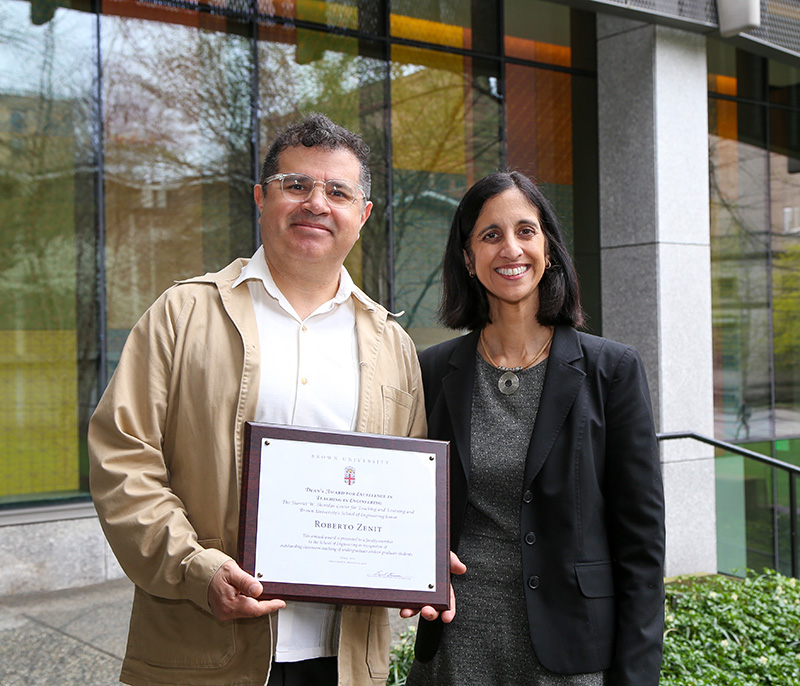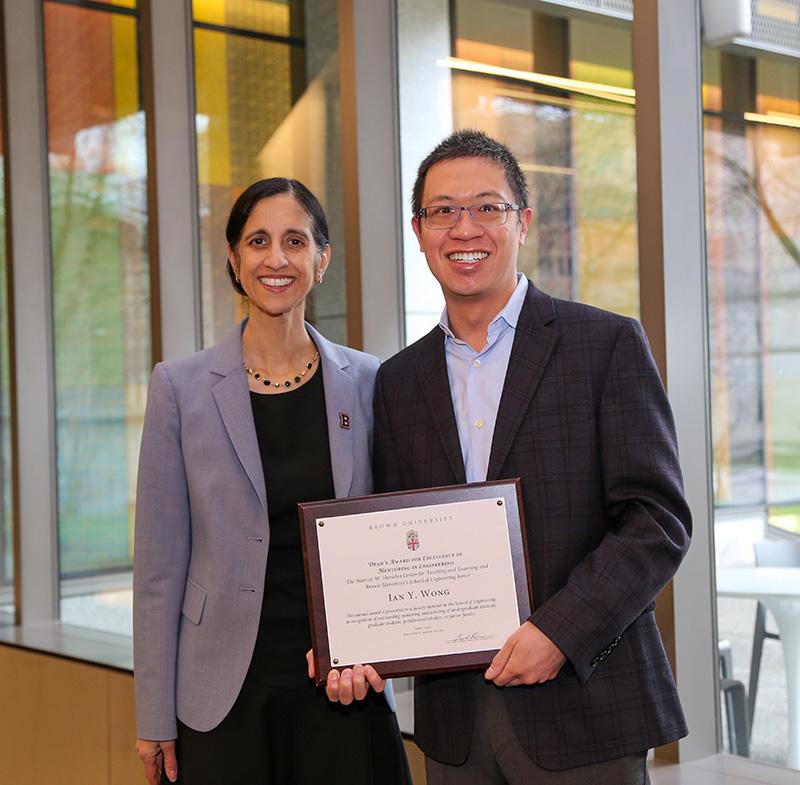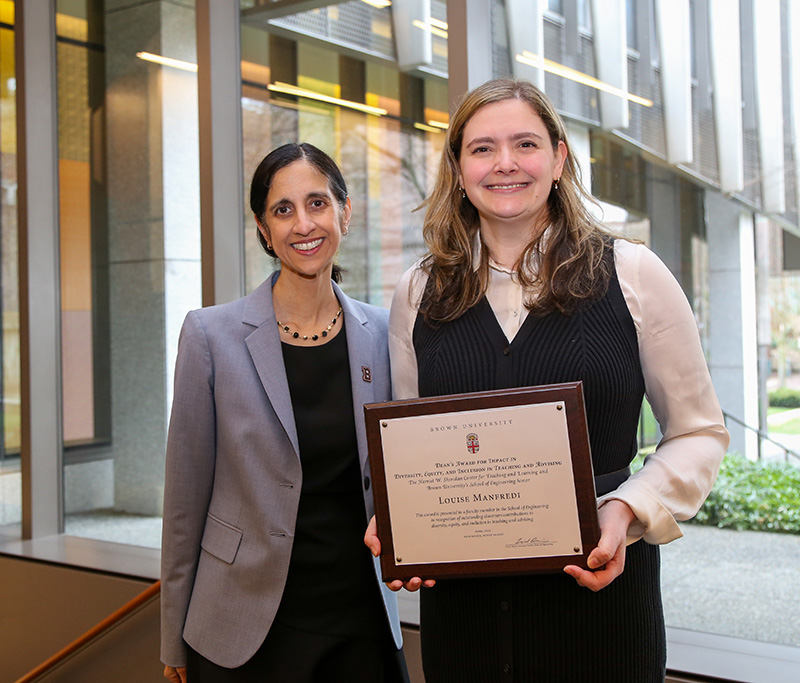 School of Engineering Professor Roberto Zenit, Associate Professor Ian Y. Wong, and Professor of the Practice Louise Manfredi were among those honored with Brown University’s awards in teaching, mentoring, and diversity and inclusion in the annual ceremony sponsored by the Harriet W. Sheridan Center for Teaching and Learning. Zenit was presented with the Dean’s Award for Excellence in Teaching in Engineering, while Wong was honored with the Dean’s Award for Excellence in Mentoring in Engineering. Manfredi was presented with the School of Engineering’s Impact in Diversity, Equity and Inclusion award, a recognition of efforts to create a more inclusive and welcoming place for teaching and advising.
School of Engineering Professor Roberto Zenit, Associate Professor Ian Y. Wong, and Professor of the Practice Louise Manfredi were among those honored with Brown University’s awards in teaching, mentoring, and diversity and inclusion in the annual ceremony sponsored by the Harriet W. Sheridan Center for Teaching and Learning. Zenit was presented with the Dean’s Award for Excellence in Teaching in Engineering, while Wong was honored with the Dean’s Award for Excellence in Mentoring in Engineering. Manfredi was presented with the School of Engineering’s Impact in Diversity, Equity and Inclusion award, a recognition of efforts to create a more inclusive and welcoming place for teaching and advising.
Zenit is the Royce Family Professor of Teaching Excellence in Engineering and his dedication to teaching, enthusiasm for fluid mechanics, and unwavering support for his students were a frequent theme of the nominations on his behalf. “Having had the privilege of taking, auditing, and TAing several of his courses—including Fluid Mechanics, Non-Newtonian Flows, and Art Fluid Engineering—I have witnessed first hand his ability to engage students with care, brilliance, and excitement,” one nomination said.
“Prof. Zenit brings fluid mechanics to life, not just through clear and accessible explanations, but also through his signature comical, yet highly effective demonstrations, which make complex concepts intuitive and fun. His classes are often cited by students as their favorites, and many credit him with igniting their passion for engineering and fluid mechanics.” Nominators also mentioned students from disciplines outside engineering who frequently sit in on his lectures, recognizing that his teaching is not to be missed.
Beyond his excellence in the classroom itself, Zenit dedicates time and effort to his students, ensuring their success through his flexibility, understanding, and relatability. Zenit has been at Brown since the fall of 2019, after serving 19 years on faculty at the Universidad Nacional Autónoma de México (UNAM) and researcher at the Instituto de Investigaciones en Materiales. He has worked in a wide variety of subjects in fluid mechanics, including multiphase and granular flows, biological flows, rheology, and more recently, the physics of artistic painting. He is a fellow of the American Physical Society, a member of the Mexican Academy of Sciences and the Academy of Engineering of Mexico, and also serves as associate editor of the journal, Physical Review Fluids.
 Wong, who is both an associate professor of engineering and an associate professor of pathology and laboratory medicine at Brown, exemplifies his deep commitment to mentorship through his support of postdocs, graduate students, and undergraduates. He was recently highlighted by Nature Methods for his lab culture and mentorship, which includes several recent alumni who are now in teaching positions at other universities. Wong has an exceptional record of mentoring undergraduates, with approximately half going on to leading Ph.D. programs including Columbia, Georgia Tech, Harvard, MIT, Stanford, and Yale. This includes four NSF (National Science Foundation) Graduate Research Fellowships and a NDSEG (National Defense Science and Engineering Graduate) Fellow.
Wong, who is both an associate professor of engineering and an associate professor of pathology and laboratory medicine at Brown, exemplifies his deep commitment to mentorship through his support of postdocs, graduate students, and undergraduates. He was recently highlighted by Nature Methods for his lab culture and mentorship, which includes several recent alumni who are now in teaching positions at other universities. Wong has an exceptional record of mentoring undergraduates, with approximately half going on to leading Ph.D. programs including Columbia, Georgia Tech, Harvard, MIT, Stanford, and Yale. This includes four NSF (National Science Foundation) Graduate Research Fellowships and a NDSEG (National Defense Science and Engineering Graduate) Fellow.
As a mentor, Wong has established a highly collaborative lab culture where undergraduate and graduate students can learn from one another irrespective of their background. For example, wet lab scientists and engineers learn about computational analysis and modeling, while theorists can learn about cell biology and materials fabrication. In this cross-disciplinary environment, undergraduates have made impactful contributions in topics spanning biomaterials and mechanobiology, computer vision and machine learning, as well as 3D printing of nanomaterials. Undergraduates have been co-authors on numerous publications.
Wong’s service to the university aligns with his commitment to student mentoring. He is a member of the university-wide Graduate Council, as well as the biomedical engineering undergraduate concentration adviser. He also serves as faculty adviser for the Society of Asian Scientists and Engineers (SASE) and serves regularly on undergraduate, masters, and Ph.D. thesis committees, including other graduate programs such as Applied Mathematics, Pathobiology and Molecular Pharmacology and Physiology (now Therapeutic Sciences).
Several current and former students offered similar praise for Wong, such as “meetings with him were particularly important in my journey towards self-efficacy. He would ask me what I thought about problems in research and genuinely hear me out. Although the difference in our knowledge was vast, he treated me as an intellectual equal and truly allowed for the cultivation of my own scientific curiosity. I owe almost all my understanding of ‘what it means to be a scientist’ to him.” His accessibility and encouragement of taking classes in adjacent fields to expand overall knowledge of the healthcare field while “enthusiastically introduc(ing) me to colleagues to discuss potential collaborations and fostering my network and career development,” were also noted by several nominators.
 Manfredi was honored for her inclusive nature of both teaching and mentoring. An Associate Professor of the Practice and Director of the Brown Design Workshop in Prince Laboratory, she works in sustainable design implementation and teaches courses in the theory and practice of design for undergraduates, as well as working with the Master of Arts in Design Engineering (MADE) program. She is currently examining the adoption of circular design methodologies and healthier material choices in the product development process in both educational and industrial settings. She leads a program of collaborative research that explores what it means to be a sustainable practitioner and to what extent this professional identity can be adopted across discipline boundaries for green economy-focused education and careers.
Manfredi was honored for her inclusive nature of both teaching and mentoring. An Associate Professor of the Practice and Director of the Brown Design Workshop in Prince Laboratory, she works in sustainable design implementation and teaches courses in the theory and practice of design for undergraduates, as well as working with the Master of Arts in Design Engineering (MADE) program. She is currently examining the adoption of circular design methodologies and healthier material choices in the product development process in both educational and industrial settings. She leads a program of collaborative research that explores what it means to be a sustainable practitioner and to what extent this professional identity can be adopted across discipline boundaries for green economy-focused education and careers.
“(Professor Manfredi) taught our fall studio course in design engineering, and took a methodical and holistic approach to our coursework. She was very approachable and students from the program were able to ask her for guidance and mentorship throughout the semester. She provided us with resources, encouragement, and valuable feedback for our projects, hallmarks of a great mentor,” said one graduate student. An undergraduate added “She has been an amazing mentor for us inside and outside of the classroom, so encouraging and helpful with all of our class projects,” noting the one-to-one meetings she has had about career paths.
“Something I have particularly appreciated about her mentorship is how she’s shown me what it means to work in engineering and design in a way that considers sustainability and the environment. Her work is rooted in her ethics and aspirations and she shows her students how they can do the same,” said yet another student. “She goes out of her way to get her students access to the resources they need; on my final project for her class, she got us in touch with experts to talk to and called in a favor on my behalf so I could get access to specialized equipment at RISD; when she sees an opportunity for a useful learning experience, she makes it happen. Even for educators in this space, I feel that she is unique in her commitment to student success.”
Prior to joining Brown in 2023, Manfredi was an assistant professor of industrial and interaction design and adjunct associate professor of engineering management at Syracuse University. Manfredi was named Educator of the Year by the Industrial Design Society of America in 2020 for her commitment to interdisciplinary design education. In 2022 Manfredi became a fellow of the Royal Society for the Arts, Manufactures, and Commerce. She is also the faculty adviser for the student chapter of Women Build at Brown, a community for students to learn about and operate power tools, machines and other crafting accessories found within the workshop environment.
The University’s Sheridan Awards Ceremony took place on Wednesday, April 30.